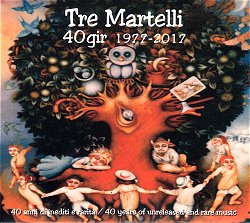
40 gir (40 Laps) 1977 - 2017
40 Years of unreleased and rare music
Felmay fy 8247

1. 40 gir; 2. Il tacchino di nome Plug; 3. La polajera; 4. Sbrando dell'oca; 5. Ra vitoria d'San Jaco; 6. Dotor s'al entra an camera / Valzer di Brunette; 7. Mal marià; 8. Baron Litron; 9. Scottish / Perigurdino; 10. Sente coumpaire Andreo; 11. 0 Venezia; 12. L'assedi 'd Verùa; 13. Poica Veja / Poica 'd Giacolin; 14. Prinsi Raimond; 15. E ben vena Magg / Corenta / Monferrina; 16. Oh mama maridemi; 17. Sbrando; 18. La bela Marianin; 19. E Cavour; 20. Poica del re / Poica di Ernesto; 21. 40 gir.Well - this is nice. And a rather different sort of compilation ... 40 years of work, demonstrated not by 'our greatest hits', but by rare and unreleased recordings. And, I would say, there's very little here that doesn't stand up to 21st century scrutiny.
I first encountered I Tre Martelli back in 1983, when they sent their first cassette, Trata Birata, for review in Folk Roots, as it was back then. Mr Anderson passed it on to me "Since you've just been there." (I'd been part of a 'Bus-load of Brits' invited to the Cante l'euv Pace Egging festival in Bra, Piemont, along with Bampton Morris, Flowers & Frolicks and sundry others.) My positive review had two equally positive results; La Ciapa Rusa sent me their first LP to review, and both bands invited me to visit them in Piemont! Something that truly changed my life, and has prompted countless return trips to northern Italy.
In the intervening years Tre Martelli have produced a dozen LP and CD recordings of their own, plus appearances in some 17 compilations. Inevitably, in a career as long as this, there have been quite a few changes in personnel, and some highs and lows. I recall Enzo Conti sent me a despondent e-mail saying that he was hardly playing at all at that time - the late-ninties, and when I heard that three members of the band had left to join another group a couple of years earlier, I thought that this probably signalled the end of the band. Fortunately, that was not the case.
Originaly, what I particularly liked about their music was the way in which it seemed to reflect my own, albeit limited, experience of the people of Piemont, the food, the wine, the general ambience of the place. I was also pleased to find that (unlike many bands of the time, both in Italy and elsewhere) they appeared less concerned with technique than with enjoying the music. However, today's playing and arrangements are of a very high order; the drift from the older, rougher traditional style of music has been accompanied by a quite startling development of technique amongst the older players, and matched by the abilities of the new, younger members.
So - what do we get here? I'm pleased to see that they've resisted putting the selected recordings into chronological order, preferring to produce an interesting running order, and with 21 tracks and almost 70 minutes duration, I'm not intending to comment on each track. What follows are my thoughts on those that I enjoy, or interest me, most.
All but one of the male vocals come from Chacho Marchelli, whose surefooted yet emotional baritone still charms the birds from the trees. The first song I'd never heard before comes as track 7, Mal marià (The Bad Marriage), sung by Elisabetta Gagliardi, a young friend of Renzo's daughter, who had joined the band as a last minute replacement during their September 2005 UK tour. So last-minute was Elisabetta's recruitment that for one song, the Towersey gig was her first public performance. One would never have known! This song may be her first recording with them.
This is followed by another female singer who ITM fans in the UK may not have heard very much, Betti Zambruno. She's a long-term member of the music scene in Piemont, and sang with La Ciapa Rusa in earlier years, but only joined ITM fairly recently. Here she does a lovely job on Baron Litron, recorded just this year.
A nice example of the early sound of the band can be found on track 9, Scottish / Perigurdino, from back in 1986. I'm sure you'll have heard them before, but I love the broken rhytm of the Perigurdino, which also features the additional 4 beats at the end of the parts - something found in a lot of the dance tunes from this area.
Track 14 is very interesting, in that it features two recordings made at the same venue, but some 38 years apart! Prinsi Raimond was recorded in the third year of ITM's existence, and sung (unusually) by Renzo Ceroni, while the second part comes from Chacho. What a lovely little bit of musical history!
I really can't leave this brief roundup of the treasures of this CD without a little bit of E Ben vena Magg (And Well Comes the May), a great local May song sung by ITM's first female singer, Bernadette Da Dalt, recorded at the 1986 Pontardawe Folk Festival, during their first UK tour.
This has been a real delight for me as an old friend of the band ... and I'm sure you would enjoy it all, too, even if you've never encoutered Trej Martej (Piemontese spelling) before.
Rod Stradling - 4.9.17
| Top | Home Page | MT Records | Articles | Reviews | News | Editorial | Map |